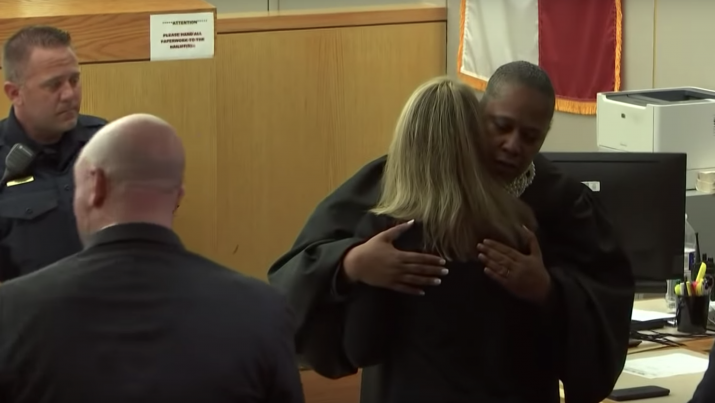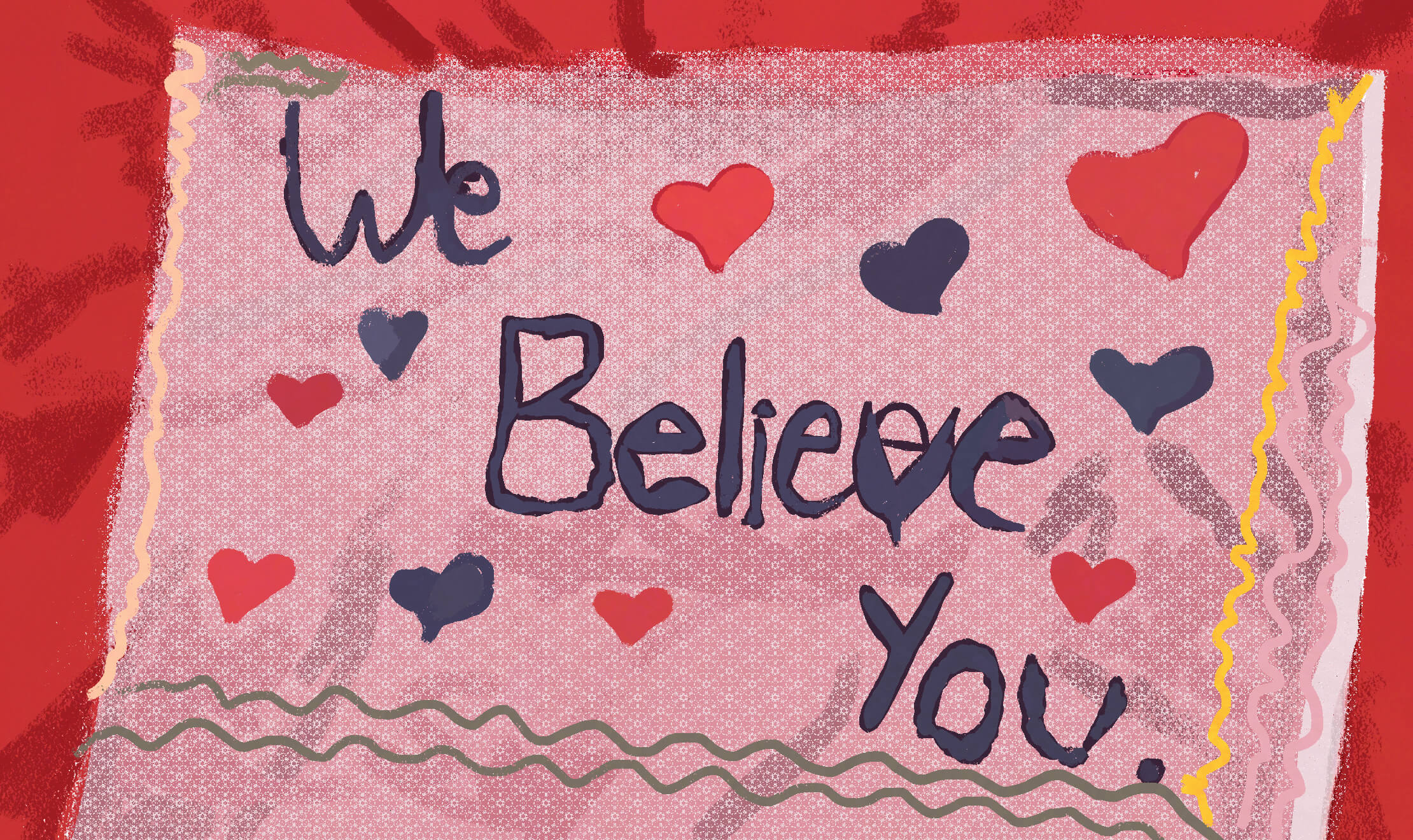
Still via YouTube / Law and Crime
The bizarre case of Botham Jean’s murder was laid to rest this week but the result was not what many of us would have hoped for. Many black people wanted a situation where justice would finally be served to a member of a protected class, the US police force.
There was brief excitement, surprise even, when Amber Guyger, Botham Jean’s murderer, was given a murder charge on 1 October 2019. For a minute, it looked like she could serve a life sentence, maybe 25 years. Considering the strange nature of the case, how could she get off lightly? She stumbled into his apartment, shot him and did not bother to use her first aid supplies to save his life. In fact, she was more concerned about losing her job than the fact she killed an innocent man in his own home. A day after getting a murder charge, she was given a 10-year sentence – and a hug and bible from Judge Tammy Kemp.
Botham’s brother, Brandt Jean, 18, expressed forgiveness to Amber. He hugged her in the courtroom and stated, “I forgive you, I don’t even want you to go to jail. I want the best for you. Because I know that’s exactly Botham would want you to do.” A lot of us knew what was about to happen next. Chris Evans, who plays Captain America in Marvel’s Cinematic Universe, responded to the video of Brandt with the comment, “This is easily one of the most beautiful things I’ve ever seen”. When Dylann Roof, a white supremacist mass shooter, attacked Mother Emmanuel AME Church in 2015, the same focus was placed on the members who expressed that they forgave Dylann and prayed for him.
I do not know what it means to process such pain and find ways to cope and I will not police people processing their hurt. But I have been thinking about the etymology of “forgiveness”. Forgiveness could more aptly be framed as a coping mechanism for the victims’ loved one after tragedy. But when it concerns black pain, it’s weaponised as an expectation for us to be the bigger person.
Allison Jean, Botham’s mother, and her lawyer spoke to Anderson Cooper on CNN about the trial and Brandt’s decision to hug and forgive Guyger. She said: “All my children were brought up in the church. We are Christian. We are people of faith. All the principles that we practise are principles of love, forgiveness, for honesty and Brandt just demonstrated, to the world, all the teachings he had by the time he’s been born”.
At the worst period of his life, Christian forgiveness was the framework used for the teenager to process his grief. His age and his pain cannot be forgotten in this conversation. Allison stated that she and his father, Bertham Jean, consented to him presenting the victim impact statement as an opportunity to express himself after he spent months saying very few words since the murder of his brother. Allison, however, after prefacing that although she respects the jury’s decision, powerfully asserted that her son “was much more valuable than 10 years”. To Allison, the trial and sentencing sends a message about how America treats its victims and the need for change in the judiciary system.
“Black pain is weaponised as an expectation for us to be the bigger person”
Bishop Talbert Swan had a stronger critique of Brandt’s words. He labelled his behaviour as a symptom of “Post Traumatic Slavery Syndrome”, a term coined by academic Joy DeGruy. According to Talbert, Brandt’s behaviour is a survival strategy, because anger and the sentiment of wanting revenge would have had dire consequences. “The need to immediately forgive oppressors who rape, murder, or brutalize us has long been a survival strategy for Blacks. After all, seeking revenge would historically result in dire consequences & holding on to our rage without meaningful ways to express it was detrimental,” he wrote on Twitter. Like Talbert, we have to recognise that there are political consequences to Brandt’s grandiose spectacle of forgiveness. People, like Chris Evans, might express their awe, but do they have any investment in undoing systematic corruption and police brutality?
In Old English, “forgiveness” means to completely remit a debt – in other words, to give up power and the desire to punish. You can look at punishment in two ways: revenge or justice. The focus in this situation is on justice – or more specifically, the allowance of the lack of justice. By creating space for “black forgiveness” to be fetishised, are we giving permission to give up power? To be slapped and to actually turn the other cheek?
After the trial concluded, the Dallas Police department focused on the behaviour of the judge and Brandt Jean, tweeting that it was an expression of “the spirit of forgiveness”. But as pointed out by civil rights lawyer S. Lee Merrit, the police department did everything they could to protect Amber. At the very beginning of the case, officers were instructed to turn off their body cams when they reached the scene. They did not handcuff her and there was obstruction of evidence. The department being able to absolve its guilt by banking on the spectacle of black forgiveness adds insult to injury. It is simply exploitative to use Brandt’s ways of coping to absolve Amber and the police department of true accountability and much-needed change.
Amber was offered redemption and grace without doing anything to earn it. When the 911 dispatcher told Amber that help was on the way, she said, “I know but I am going to lose my job” – which she did. She also did not plead guilty, which meant that the family had to sit and listen to the defence argue that the act of taking a “big” (read: black) man’s life in his own home was not evil but actually Amber making “innocent mistakes”. Her defence took it a step further and stated that to hold her accountable would be to hold her to an impossible standard – because she was tired after working a long shift.
What made this case really eerie and uncomfortable was how black people went out of their way to make her comfortable. The coddling and leniency given to her had me questioning whether I should start closing my eyes when white women cry, in case I too get enchanted. First, there was the video of a police officer in the courtroom, who was a black woman, stroking Amber’s blonde hair during the trial. At the end of the trial the judge, also a black woman, left her seat to give her hug and handed her a bible. This is what made the acts of “forgiveness” truly a spectacle. They did not need to do all that, but why did they?
When discussing how Christianity was practised in the Antebellum South, Dr Albert Ratobeau stated: “The moral obligations of Christian life in the midst of a thoroughly immoral system created opportunities for slaves to assert their own virtue and personal dignity despite the reigning doctrine of black inferiority and white privilege and superiority”. Or as Michelle Obama famously said, “When they go low, we go high”. The messages emphasised for generations shape what we consider as “praiseworthy” responses to racialised injustice. Funnily enough, this Christian forgiveness of empathy and grace is rarely expressed for US black LGBTQ+ youth, who are frequently kicked out of their homes and can also struggle to find a safe space in the church.
“Police corruption and powerful police unions continue to protect police officers across the Western world from being punished justly for their crimes”
Ten years for Amber is the equivalent of a slap on the wrist. People, like the exonerated five in Ava DuVernay’s When They See Us, or the M25 Three in the UK, have received longer sentences for much less. Last year, the UK saw a spike in the use of violent force, with black people being far more likely to be on receiving end. In Kirkcaldy, Scotland, Sheku Bayoh was killed in police custody, and yet none of the police officers involved in his death have been charged. We need change. We can talk restorative justice but not this. Police corruption and powerful police unions continue to protect police officers across the Western world from being punished justly for their crimes.
The phenomenon of black forgiveness is pervasive and operates on many levels. It is the same audacity used to tell me to explain to a racist why they are racist. What is crazy is that even when a black person is murdered, the front of the “forgiving spirit” is still expected to be maintained. And we maintain it. We believe we are collecting points for entry into heaven by absolving white accountability.
So how can we move forward as a culture if we do not let each other grow properly? Systems of oppression and corruption need to be vehemently challenged and forced to change, not be forgiven. As Killer Mike said during the Revolt’s The Black Agenda Summit 2019, “You are free, so act it”.





